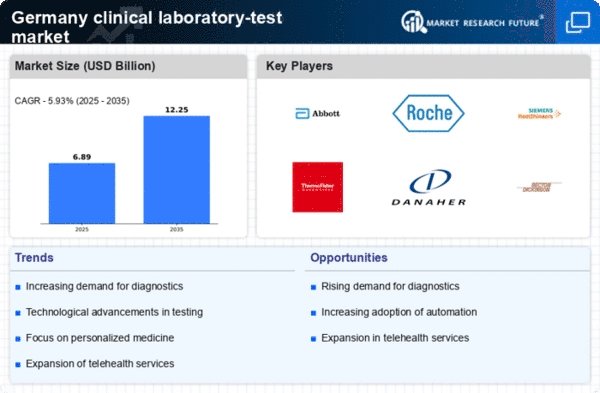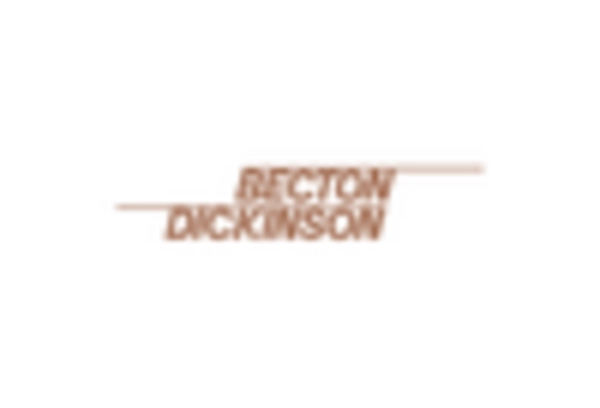Focus on Personalized Medicine
The clinical laboratory-test market is witnessing a shift towards personalized medicine, which tailors medical treatment to individual characteristics. This approach is gaining traction in Germany, as healthcare providers increasingly recognize the importance of genetic and molecular testing in developing targeted therapies. The market for personalized medicine is projected to grow significantly, with estimates suggesting a CAGR of around 7% over the next five years. This trend encourages clinical laboratories to invest in advanced testing technologies and methodologies, thereby enhancing their capabilities and positioning themselves competitively within the clinical laboratory-test market.
Integration of Advanced Technologies
The integration of advanced technologies into the clinical laboratory-test market is transforming the landscape of diagnostic testing in Germany. Innovations such as artificial intelligence (AI) and machine learning are being utilized to enhance the accuracy and efficiency of laboratory tests. These technologies enable laboratories to process large volumes of data swiftly, reducing turnaround times for test results. Furthermore, the adoption of automation in laboratory processes is expected to increase operational efficiency by up to 30%. This technological evolution not only improves the quality of testing but also supports laboratories in managing costs effectively, thereby fostering growth in the clinical laboratory-test market.
Rising Demand for Diagnostic Testing
The clinical laboratory-test market in Germany experiences a notable increase in demand for diagnostic testing. This trend is driven by a growing awareness of health issues among the population, leading to more individuals seeking preventive and routine health check-ups. According to recent data, the market is projected to grow at a CAGR of approximately 5.2% over the next five years. This growth is indicative of a shift towards proactive healthcare management, where early detection of diseases is prioritized. As a result, clinical laboratories are expanding their testing capabilities to meet this rising demand, thereby enhancing their service offerings and improving patient outcomes.
Aging Population and Chronic Diseases
Germany's aging population significantly impacts the clinical laboratory-test market, as older individuals typically require more frequent medical testing. The prevalence of chronic diseases, such as diabetes and cardiovascular conditions, is on the rise, necessitating regular monitoring and diagnostic assessments. It is estimated that by 2030, nearly 30% of the German population will be over 65 years old, further driving the demand for laboratory tests. This demographic shift compels clinical laboratories to adapt their services to cater to the specific needs of older patients, thereby expanding their market reach and enhancing service delivery.
Increased Investment in Healthcare Infrastructure
The clinical laboratory-test market in Germany benefits from increased investment in healthcare infrastructure. The government and private sector are channeling funds into modernizing laboratory facilities and expanding testing capabilities. This investment is crucial for enhancing the quality of healthcare services and ensuring that clinical laboratories can meet the growing demand for various tests. Reports indicate that healthcare spending in Germany is expected to rise by approximately 4% annually, which will likely bolster the clinical laboratory-test market. Improved infrastructure not only facilitates better service delivery but also encourages innovation within the sector.
















